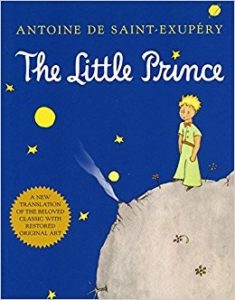
For years, I have liked the following quote attributed to Antoine de Saint-Exupéry:
If you want to build a ship, don’t drum up men and women to gather wood, divide the work, and give orders. Instead, teach them to yearn for the vast and endless sea.
I have seen similar verses from other sources. Its origin matters little to me. Its essence is inspiring for anyone who wishes to be a leader professionally or personally, in a small or large context. A strong desire for achievement is certainly not enough for great accomplishment, but without that inner drive and vision, very little could be realised even for a very talented person. A couple of months ago, I quoted this to Terry in a discussion. That lead me to dig out Saint-Exupéry’s books and read them. Here comes this blog entry of The Little Prince.
Some would say this is a children book. I think this is true, as children would enjoy reading it. In my opinion, adult readers would find it brutally honest and alarming upon a little self-reflection. Read the little Prince’s thought about the lamplighter here and see what you think:
Now that man, the little prince said to himself as he continued on his journey, that man would be despised by all the others, by the king, by the very vain man, by the drunkard, by the businessman. Yet he’s the only one who doesn’t strike me as ridiculous. Perhaps it’s because he’s thinking of something besides himself.
Ah, for you to appreciate the passage above, I should first introduce you to these characters:
The king is an hilariously ineffective king of a kingdom with no residents other than himself. He takes great pride in being reasonable though.
The very vain man demands admiration from any visitor to his planet. He likes to regard himself as the most handsome, the best-dressed, the richest and the most intelligent man on the planet with one resident, just himself.
The drunkard drinks to forget that he is ashamed of excessive drinking. Very sad indeed, but do not we all know one or two examples in real world who somewhat resemble the drunkard?
The businessman is obsessed about counting stars as a form of wealth, and believes that he is concerned with matters of consequence.
When you find a diamond that belongs to nobody, it is yours. When you discover an island that belongs to nobody, it is yours. When you get an idea before anyone else, you take out a patent on it: it is yours. So with me: I own the stars, because nobody else before me ever thought of owning them.
The lamplighter earns some respect from the prince, as the little prince said to himself:
It’s quite possible that this man is absurd. But he’s less absurd than the king, the very vain man, the businessman, and the drunkard. At least his work has some meaning. When he lights his lamp, it’s as if he’s bringing one more star to life, or one more flower. When he puts out his lamp, that sends the flower or the star to sleep. Which is a fine occupation. And therefore truly useful.
The geographer, who lives on the sixth planet visited by the little prince, does not know whether there are oceans, mountains, cities, rivers or deserts on his planet, because he is not an explorer. As a geographer, he does not go out to describe those. He is far too important to go wandering about. He never leaves his study. He receives the explorers there and questions them and writes down what they remember. Unfortunately, there is not one explorer on his planet. Is this the sadness of specialisation and inflexibility? Are we heading there as a society in general?
The geographer is not totally unhelpful towards the prince though. He indeed recommends the prince to visit the planet Earth. Whenever I write or speak or hear the phrase “the planet Earth”, I hear the voice of David Attenborough. How fascinating! The Earth is the saddest of all. It has one hundred and eleven kings, seven thousand geographers, nine hundred thousand businessman, seven-and-a-half million drunkards, three-hundred-eleven million vain men. In total, that is about two billion grow-ups. I got goosebumps when I read this bit of description of the planet Earth. How utterly hopeless we are! My new allergy is the phrase “grow-ups”. Even the mighty Claritin-D cannot help with this allergy.
Whether scientific or not, Saint-Exupéry shared with us some more wisdom in the chapters about the prince’s visit to the planet Earth, his final stop:
One sees clearly only with the heart. Anything essential is invisible to the eyes.
What I’m looking at is only a shell. What’s most important is invisible.
You become responsible forever for what you’ve tamed. You’re responsible for your rose.
No one is ever satisfied where he is. (The railway switchman commented about the travellers.)
What makes the desert beautiful is that it hides a well somewhere.
People where you live grow five thousand roses in one garden…yet they do not find what they are looking for…They do not find it. And yet what they are looking for could be found in a single rose, or a little water….But eyes are blind. You have to look with the heart.
Please do not call me a grow-up. I do not wish to be one, absolutely not one as portrayed in The Little Prince.